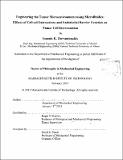Engineering the tumor microenvironment using microfluidics : effects of cell-cell interactions and endothelial barrier function on tumor cell intravasation
Author(s)
Zervantonakis, loannis K
DownloadFull printable version (20.68Mb)
Other Contributors
Massachusetts Institute of Technology. Department of Mechanical Engineering.
Advisor
Roger D. Kamm.
Terms of use
Metadata
Show full item recordAbstract
90% of cancer related deaths are due to metastatic disease and there is a need for a better understanding of cell-microenvironment interactions to identify new therapeutic targets. A key step during cancer metastasis is cancer cell intravasation (entry of cancer cells into the blood vessels) that results in tumor cell dissemination into distant organs. During this process, tumor cells navigate a complex microenvironment and interact with multiple cell types. This thesis is aimed to develop a microfluidic-based intravasation assay that allows for direct observation of tumor cell motility combined with quantitation of the endothelial barrier function. Compared with traditional in vitro assays, microfluidic assays enable "user-defined" design of the cellular and acellular microenvironment with spatio-temporal control and live high-resolution imaging. Formation of confluent endothelial layers in the device was confirmed with immunofluorescence staining for endothelial cell-cell junctions and we compared our diffusive permeability values with published in vivo and in vitro data. We employ this microfluidic assay to investigate the role of endothelial barrier function during tumor cell intravasation to address a critical question in cancer research: does tumor cell intravasation require a leaky endothelium? To induce vessel leakiness we perturb the barrier using biochemical factors, endothelial cells with low expression of basement membrane proteins and signaling with macrophages. Under all these conditions, tumor cell intravasation rates increased and we confirmed these results for multiple tumor cell types. Characterization of macrophage secreted factors and M1/M2 polarization status, identified that blocking macrophage-secreted TNF-a restored endothelial permeability and reduced tumor cell intravasation. In agreement with these results, we also found that the number and dynamics of tumor-endothelial interactions were dependent on endothelial barrier function. A novel feature of the developed assay is the ability to image in real-time the process of tumor cell intravasation, while also enabling accurate control and quantitation of the functional characteristics of the endothelial barrier. Our results not only demonstrate the important role of cell-cell paracrine signaling and biochemical factors in regulating tumor cell intravasation, but also have important implications for strategies aimed to disrupt or normalize vasculature in vivo. Keywords: 3D Microfluidics, Endothelial permeability, Cancer cell Intravasation, Macrophages.
Description
Thesis (Ph. D.)--Massachusetts Institute of Technology, Dept. of Mechanical Engineering, 2013. Cataloged from PDF version of thesis. Includes bibliographical references (p. 87-97).
Date issued
2013Department
Massachusetts Institute of Technology. Department of Mechanical EngineeringPublisher
Massachusetts Institute of Technology
Keywords
Mechanical Engineering.